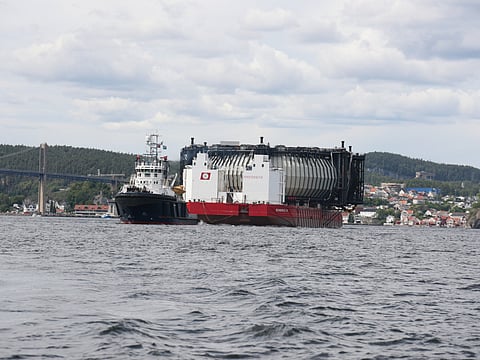

After being towed 510 nautical miles, the 'Marine Donut' is now in the Romsdal Fjord. The theory goes that this closed-containment salmon farm will eliminate the lice problem, prevent escapes and improve the health and quality of the fish. Now it is time for SalMar to fill it with 200,000 salmon weighing 2.5 kilograms and verify if the hypotheses surrounding its benefits come true.
The concept of the 'Marine Donut' is based on a closed-containment aquaculture system in the shape of a donut that prevents escapes and contamination, and minimizes the risk of diseases, algae, and sea lice. Thus, the need for antibiotics and other medications and preparations is greatly reduced. The farmer also gains full control over the fish and the environment thanks to digitalization and monitoring, as well as good control over the efficient feeding factor, which further reduces costs.
Nils Johan Tufte, CEO de Bluegreen and founder of 'Marine Donut' came up with the idea of this closed-containment aquaculture system, and in 2019, Mowi received two development permits from the Norwegian Directorate of Fisheries for this project. However, in June last year, the world's largest supplier of farmed salmon decided to sell both this development project and the so-called 'Egg', and it was immediately announced that Bluegreen had bought the permits from Mowi.
Just three months later, SalMar assumed responsibility for the concession project of the development and signed a contract for the construction of the first 'Marine Donut'. "SalMar is innovative and ambitious," Bluegreen's CEO said of his new partner at the time. "They are not afraid to explore new technology that solves the challenges facing the industry. We are impressed by their investment in offshore farming, and we hope that Marine Donut can play a role in this."
"Our goal is to demonstrate that despite the fact that the Donut has a higher capex than traditional cages, the costs per kg of fish are competitive. The costs of feed and medicine go down, fish health and fish quality go up. In addition, the facility provides smarter logistics for the breeder. Overall, this results in increased profitability," Nils Johan Tufte then added.
Last week, the 'Marine Donut' undertook its final journey from Bamble to Romsdal Fjord, where SalMar will fill it with 200,000 2.5 kg salmon that will swim in the current inside the donut until they reach 5.5 kg and are ready to be harvested. This is the moment of truth. "Now the real fun begins," Tufte stated that day. "This is where we verify our hypotheses that 'Marine Donut' promotes fish health, delivers premium fish quality, and ensures profitability for the fish farmer."
"Marine Donut is an exciting concept and we look forward to developing the concept further together with the supplier," said Roger Bekken, COO Farming in SalMar, on partnering with Bluegreen last September. "We have entered into this agreement with Bluegreen because they are forward-thinking with a highly skilled and experienced organisation. SalMar has always been innovative and is therefore interested in using new technology to increase the production of healthy food," he had also said.
The admiration between the partners is mutual. Also at the signing of the contract, the CEO of Bluegreen and founder of 'Marine Donut' pointed out the importance of having the experience and know-how of one of the world's largest fish farmers as a customer. "We have learned an incredible amount since we started talking to SalMar. They have had valuable input that has improved the project, especially in terms of functionality and risk assessment from the user's perspective," Tufte said.
"We feel the energy from both SalMar and partners. Everyone has the attitude: This is something we will achieve together!" he then continued. An essential energy to carry out a complex project like this one in which Bluegreen has relied on various subcontractors within the different areas of expertise. A teamwork of which the company is very proud, as shown in the movie about the 'Marine Donut' that Bluegreen published this week, and which gives an idea of how many factors and companies come into play for an innovation project like this.
With a diameter of a whopping 60 meters, a volume of 22,000 cubic meters, and a weight of just under 500 tonnes, the breeding facility is the world's largest thermoplastic construction but also a facility that can be controlled from onshore, anywhere in the world. Now is the time to demonstrate proof of concept and unleash the full potential that lies in it. All eyes are on this donut floating in the Romsdal Fjord.
Bluegreen is a leading international thermoplastics company. The company focuses on three industries in particular: the aquaculture industry, environmental technology (CCUS), and more traditional infrastructures (water distribution and renewable energies). Within aquaculture, Bluegreen seeks to contribute to solving the problems of escaping, sea lice and over-consumption of medicine and feed through its own state-of-the-art 'Marine Donut' closed fish farming solution.
SalMar is the second-largest salmon farmer in the world and has production in Norway, Offshore, Iceland, and Scotland. The company has been a driver for the sustainable development of the aquaculture industry since 1991. With a "passion for salmon," it produces food to over 50 countries worldwide. Además de las operating areas mencionadas, SalMar tiene tres importantes proyectos en desarrollo: 'MariCulture / Smart Fish Farm', 'Arctic Offshore Farming', y 'Marine Donut'.
